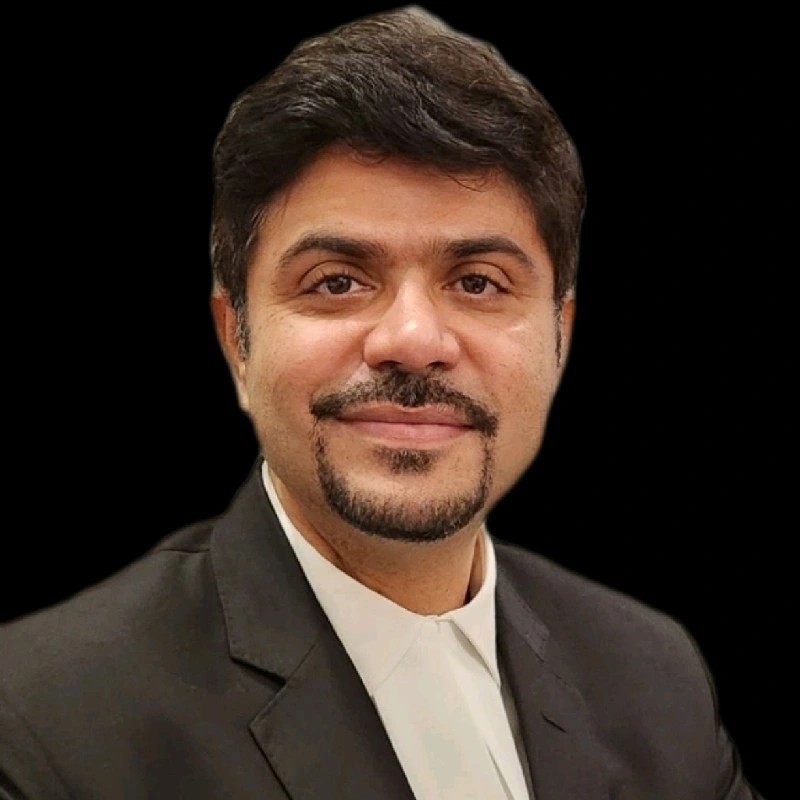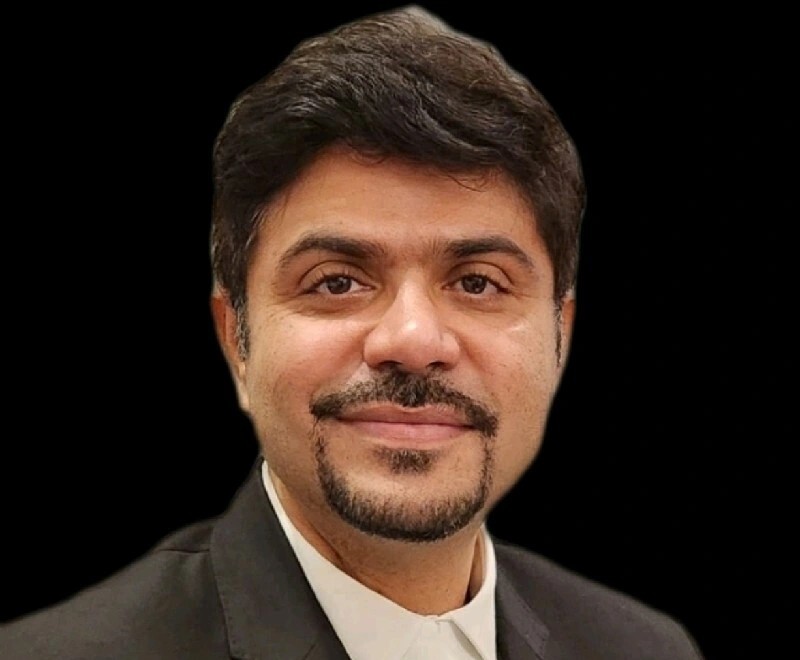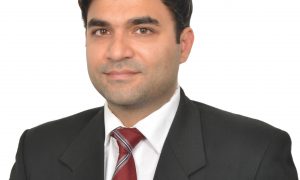This interview has been published by Anshi Mudgal and The SuperLawyer Team

With more than two decades of legal experience and background in physics, what was the inspiration for you to transition to law and how has your scientific education, specifically related to physics, influenced your approach to legal practice?
I consider myself an accidental lawyer, as law was not my original ambition during school or while pursuing my graduation in physics. However, circumstances led me to take the law entrance exam, where I was selected. Interestingly, I had also appeared for other entrance exams, including one for mass communication. Before moving into law, I also spent some time training as an Assistant Commander in the Indian Armed Forces. My background in science has been very useful in my legal career, as it has helped me develop strong analytical and problem-solving skills, which are key in law. These skills have made it easier for me to understand and address legal issues.
When I started practising law in 1998, the telecom and IT outsourcing sectors were in their infancy in India. My scientific background enabled me to grasp the technical aspects of these fields with ease. For instance, I worked on matters involving leased lines, the introduction of VOIP (Voice Over Internet Protocol), and regulations like the prohibition on terminating internet calls over PSTN (landline) connections, which required separate devices at the time. This technical knowledge gave me an advantage early in my career, enabling me to work closely with clients and gain valuable experience. Even now, my scientific background remains crucial, especially in emerging fields like AI, machine learning, and medical devices, where a solid understanding of science is often essential in areas like data privacy, data protection and competition law.
While many assume that a lawyer with a science background would naturally gravitate towards intellectual property or patent law, my career path has been far more diverse, involving criminal cases, civil disputes, and regulatory matters across multiple sectors. My science background has been valuable in helping me interpret and analyse complex information accurately. Although I never expected my physics education to connect so closely with my legal work, it has sharpened my analytical skills and allowed me to handle a broader range of issues. My journey has shown that science and law can complement each other in meaningful ways.
Given your background in science, law, and ethics, what is your perspective on the challenges we may face as emerging technologies like AI, IoT, and blockchain become integrated into our legal and societal systems? Specifically, how do you see AI influencing forensic evidence and the practice of law? What ethical dilemmas do you anticipate arising from these technologies, especially considering their potential impact on society and the legal framework in a populous country like India?
With my background in science and law, I see the integration of emerging technologies like AI, IoT, and blockchain into legal and societal systems as both a challenge and an opportunity. AI has the potential to revolutionize legal practice and judicial processes, but its adoption must balance the benefits of innovation with addressing ethical concerns and ensuring societal well-being, especially in a diverse and populous country like India.
India is uniquely positioned to lead in the global AI landscape, with much of the development in generative AI and software engineering being driven by Indian professionals, both domestically and abroad. As a hub of global IT leadership, India has the expertise and resources to shape the future of AI responsibly. This role comes with the responsibility to establish ethical frameworks that ensure AI acts as a tool for justice and societal progress, rather than a source of harm or inequity.
AI’s application in the legal field can be divided into three stages:
- Basic Automation: At the most basic level, AI can handle routine tasks and manage high-volume cases, such as traffic violations, where penalties can be automatically issued based on photographic evidence. Bulk cases like recovery suits, small financial claims and builder disputes can also be streamlined, with AI drafting basic judgments. A “maker-checker” system can ensure accuracy and save judicial time for more complex matters.
- Case Categorization and Prioritization: The second stage involves AI helping to categorize and prioritize cases, allowing the judiciary to focus on critical matters involving life, liberty, privacy, and public policy. Courts already use categorization for bail matters, and AI could streamline less critical cases. This would free judges to focus on high-stakes issues like corruption and white-collar crimes, improving judicial efficiency without compromising the need for human compassion in decision-making.
- Complex and Sensitive Cases: The third stage is AI’s role in supporting complex and sensitive cases, such as those involving fundamental rights or criminal offenses. Ethical dilemmas require nuanced understanding and empathy, which AI cannot replicate. Judges must retain ultimate authority in such matters to ensure justice is served with compassion and context. AI can help with research, analysis, and gathering evidence, but final decisions should be made by humans to ensure fairness and to uphold the law.
AI is set to change the way lawyers work by automating tasks like documentation, research, and drafting. This might reduce the need for some entry-level tasks but opens up opportunities to focus on skills like analysis, strategy, and argumentation. For young lawyers, especially those impacted by the pandemic, the key will be adapting to these changes while building courtroom skills and upholding ethical practices that technology can’t replace.
Ethical dilemmas are a major concern in the use of AI, especially generative AI, which can create false information that may be misused in courtrooms if not carefully monitored. Over-reliance on AI could also lead to decisions being made without adequate human oversight. While AI can be a valuable tool, it must serve human objectives, not replace human judgment. To ensure justice and fairness, India’s legal framework must adapt to technology with regulations that balance innovation and safeguards against its misuse. Training for lawyers and judges on AI’s capabilities and limitations is essential for responsible use. By embracing AI cautiously and ethically, India’s legal system can benefit while ensuring that compassion and fairness remain at the heart of justice.
Given your experience in healthcare, where AI and robotics are increasingly used in elder and newborn care, ethical concerns about privacy, data misuse, and autonomy are growing. Neuroethics, particularly around “brain rights,” is becoming a global issue, yet India lags in addressing it. With India’s focus on fundamental rights, when do you foresee lawmakers accelerating discussions and legislation to protect cognitive liberties and ensure AI respects privacy, autonomy, and dignity?
Unfortunately, what we observe globally, and particularly in India, is that legislation often emerges as a reaction rather than proactive action. Laws, especially key ones, tend to be overhauled only in response to significant events or crises. Whether it pertains to criminal laws or other sectors, this reactive approach delays progress. AI is already prevalent, and we need to regulate it now. If we don’t, we’ll always be reacting to its effects rather than shaping its development. Importantly, no law is cast in stone; even our Constitution permits amendments.
A key example of delayed regulation is the medical device industry, which was initially governed by the Drugs and Cosmetics Act but took years to develop a dedicated framework. As medical devices increasingly incorporate AI, such as blood glucose monitors that use real-time data for more personalized care, the need for timely regulation becomes more urgent. While AI enhances precision, ethical concerns about autonomy and accountability arise. Robust regulation is essential to ensure safety, fairness, and accountability as these technologies evolve.
Neurosciences represent a frontier where technology and ethics intersect, with initiatives like Neuralink, led by Elon Musk, showcasing both promise and controversy. Technologies that bridge physical or neurological impairments, allowing the brain to communicate directly, offer hope for individuals with conditions like neurodegeneration or spinal cord injuries, enabling them to “speak” through neural interfaces. These advancements could also change how we understand patients in vegetative states, distinguishing between natural responses and conscious communication.
Also, the concept of brain preservation opens exciting possibilities, such as preserving the brains of great minds like Einstein or Stephen Hawking to continue their problem-solving and creativity even after their deaths. Breakthroughs in tissue generation, like replicating tumours to test treatments, are already improving healthcare outcomes and paving the way to cure diseases like cancer. Combining brain preservation with AI could extend the knowledge of exceptional individuals, allowing their wisdom to guide future generations and drive progress long after their lifetimes.
Ethical concerns are natural, especially in fields like neuroscience and AI, dealing with issues such as consent, privacy, and misuse. However, these concerns should guide progress, ensuring that innovation aligns with society’s values. Throughout history, humanity has advanced by tackling ethical challenges. The integration of AI, neuroscience, and related technologies offers huge potential, but it must be regulated carefully. By embracing these innovations responsibly, we can push boundaries and ensure technology benefits humanity, with compassion, ethics, and human oversight at the core, especially in medicine and law. Technology should remain a tool in human hands, not the other way around.
Starting LexCounsel early in your career, you’ve worked extensively in litigation and dispute resolution. What challenges have you faced in these areas, and how have you proven your expertise? Additionally, for newcomers entering the field, what advice would you offer on balancing specialization with broader growth opportunities?
When I began my career as a junior advocate, I saw law as a professional degree that offered the unique opportunity to start an independent practice right away, unlike many professions that require applying for jobs. Although law wasn’t my original plan, I knew I wanted to build my own practice. I gave myself six to eight months to try it independently, and fortunately, my first client’s payment covered my expenses, allowing me to grow. Looking back, running my own law firm has been a highly rewarding experience.
In the early years of my career, I intentionally took on a wide range of work because I believed that diverse experience is key to intellectual and professional growth. I handled litigation matters that law firms often take on selectively, such as winding-up petitions, cheque bounce cases, and white-collar crimes. Law offers no one-size-fits-all path to success; some lawyers excel by specializing in a single area or focusing on one court, while others diversify into areas like litigation, arbitration, and regulatory work in forums such as the NCLT or NCDRC. In my view, the early years should be about embracing any work that comes your way, as these formative years are vital for understanding the nuances of different practice areas.
One of the key lessons I have learned is that drafting should always follow a structured approach. Whether you are preparing a reply or initiating a case, it is essential to start by understanding the facts of the case, identifying the key issues, and conducting thorough legal research. Only then should you proceed with drafting, ideally in consultation with a senior or mentor. A common mistake among young lawyers is starting with assumptions and drafting without proper research, which often results in errors. Developing a disciplined approach to drafting and research is a skill that pays dividends throughout your career.
The legal profession demands relentless hard work and dedication. Unlike other fields, there is no concept of a Monday-to-Friday workweek, weekends off, or a casual start to the week. The profession is highly competitive and unforgiving. One of my seniors used to say that law is a “jealous profession.” If you neglect it or treat it as secondary, it will leave you. Success requires consistent effort, particularly in the early years. Moreover, knowledge acquisition is non-negotiable in this field. If a lawyer fails to build a strong foundation of knowledge in the initial years, their career will face significant challenges after seven to ten years. A solid start is critical for long-term stability and growth in the profession.
Hard work is essential, both in law school and in practice. While some believe law is learned only through practice, I’ve seen that students with strong academic discipline tend to perform better professionally. Law school builds skills like hard work and achieving results, which are crucial in the field. Those who neglect assignments or skip classes often struggle later on. In the early years, you may rely on family support or modest earnings, but without a solid knowledge base and experience, meeting expectations becomes challenging. My advice to young lawyers: embrace learning, build a strong foundation, and dedicate yourself to the profession. There is no greater embarrassment than being unprepared, and no greater satisfaction than mastering your craft and earning the respect of your peers and clients.
Could you share your experience representing multinational corporations, which have unique legal needs compared to individuals or smaller companies? How have you navigated complex corporate transactions, dispute resolution mechanisms, and international arbitration systems? Given the importance of international law in these areas, how have you incorporated these learnings into your practice, and what advice would you give to learners on the significance of studying international law, especially with emerging technologies in mind?
In the early 2000s, Indian employees of multinational corporations faced challenges due to the casual approach to bribery and facilitation payments, as the US Foreign Corrupt Practices Act allowed small facilitation fees to expedite routine government actions. However, the introduction of the UK Bribery Act, which banned such payments, marked a shift toward stricter compliance. I’ve witnessed teams being asked to resign due to violations of these laws, often from unintentional actions. Over time, with stronger anti-corruption laws, increased media scrutiny, and corporate training programs, compliance levels have improved. Today, employees understand the importance of following these rules, even if it means losing business, helping create a culture of integrity and reducing issues with non-compliance.
In terms of litigation, our journey began when we established ourselves as a corporate and commercial law firm in 2004. Initially, our work was centred on corporate transactions, but clients began approaching us with disputes related to their franchise agreements, international contracts, and other business dealings. Since we understood their businesses and agreements, they preferred us over others to handle these disputes.
At first, we relied on senior advocates for court appearances, but this approach had limitations, such as difficulties in coordinating with external counsel and a lack of accountability. This led us to take a more hands-on approach, handling many hearings ourselves while engaging while reserving senior counsels only for crucial arguments. This shift improved responsiveness, reduced litigation costs, and built client confidence, with many now trusting us to handle cases independently or to decide when a senior counsel is needed.
This approach has helped us build trust with our clients by ensuring clear communication, accountability, and adherence to timelines. This level of organisation and transparency, combined with our ability to represent clients directly in court, has been a winning formula. However, success in the legal profession doesn’t follow one path. Some lawyers thrive by specialising, while others succeed by maintaining a broad practice. For us, a mix of client trust, responsiveness, and adaptability has been key to building our practice.
The legal profession has evolved significantly over the years. How has this change, particularly in terms of ethical implications and AI, impacted legal practice during your decades of experience? Additionally, with the shift towards a more “glocal” mindset, how do you see this influencing the Indian legal profession and its professionals?
The legal profession has changed a lot over the years, especially with technology, ethical challenges, and AI. In my early days, technology wasn’t as important. Clients would sometimes comment on my youth, which I initially took as a compliment but later realized it was also a sign of their concerns about my experience. Over time, however, the profession embraced technology, especially during the pandemic, which pushed the legal system to adapt to virtual platforms and digital filing systems. Courts, like the Delhi High Court, took the lead in this digital transformation. Today, senior advocates confidently argue complex cases using tablets, with neatly organised digital files. It’s remarkable how the profession has not only adapted to these changes but has also become more environmentally conscious.
This change extends beyond technology. There has also been a generational shift towards more pragmatic and socially conscious thinking within the legal fraternity. Whether it’s landmark judgments advancing the rights of the LGBTQIA+ community, the decriminalisation of outdated laws, or lawyers taking up environmental and social causes, we are witnessing a progressive evolution in our profession. Many lawyers actively assist the judiciary by initiating public interest litigations, serving as court commissioners, or bringing matters before forums like the National Green Tribunal. This heightened social responsibility is not new—lawyers have historically led battles for freedom and human rights worldwide—but it is heartening to see the Indian legal community continue this tradition with renewed vigour and adaptability.
The progress of the legal profession in India is commendable, especially considering the complexity of our multi-religious, multicultural society. The legal community has shown an impressive ability to adapt, turning challenges into opportunities. Advancements such as digitally indexed Supreme Court judgments and QR codes on Delhi High Court rulings, while seemingly small, collectively mark a significant transformation in making the profession more efficient, accountable, and responsible. The evolution of India’s legal fraternity, driven by technological adaptation, environmental awareness, and a commitment to social justice, is inspiring and reflects the resilience of the community in upholding core values in a rapidly changing world.
Given the wide range of portfolios that you manage. How do you see keeping yourself motivated, keeping others around you motivated and keeping the positive environment going as you were talking about?
I have an intellectual drive within me that pushes me to constantly challenge myself and pursue new opportunities, whether in personal growth, financial decisions, my child’s education, or my legal practice. This mindset has shaped my professional journey, where I’ve continually sought to expand into new practice areas and learn something different. Over time, this curiosity has helped me, and my firm evolve into a multi-faceted legal practice, combining both interdependent and independent areas. For example, clients from the healthcare sector may start with litigation services but eventually need help with regulatory matters like medical device registration or navigating the complexities of drug pricing under the Drug Price Control Order (DPCO). This has allowed us to diversify and grow while developing unique expertise in each area.
Adaptability has been key to my journey. Early on, I worked in corporate law, handling tasks like drafting resolutions and conducting due diligence. While important, I found these tasks lacked the creativity I wanted. To stay engaged, I started taking on litigation work, eventually branching out into areas like white-collar crimes and insolvency under the IBC. The constant changes in law, like updates to the Companies Act and the introduction of the IBC, kept me learning. Our firm has always embraced new challenges, which has helped us build a diverse and exciting portfolio of work, which has kept our work dynamic and exciting.
What keeps me going is the constant opportunity to learn. In law, no one can claim to be a master; we’re all lifelong students. I embrace this mindset, viewing every challenge as a chance to grow. This approach has not only shaped my career but also the ethos of our firm. The pursuit of intellectual curiosity and a willingness to adapt have been the foundations of my journey, helping me expand into diverse practice areas and maintain passion for my work. As a student of law, I remain committed to learning and evolving, ensuring my journey is as dynamic as the field itself.
Get in touch with Alishan Naqvee –


























